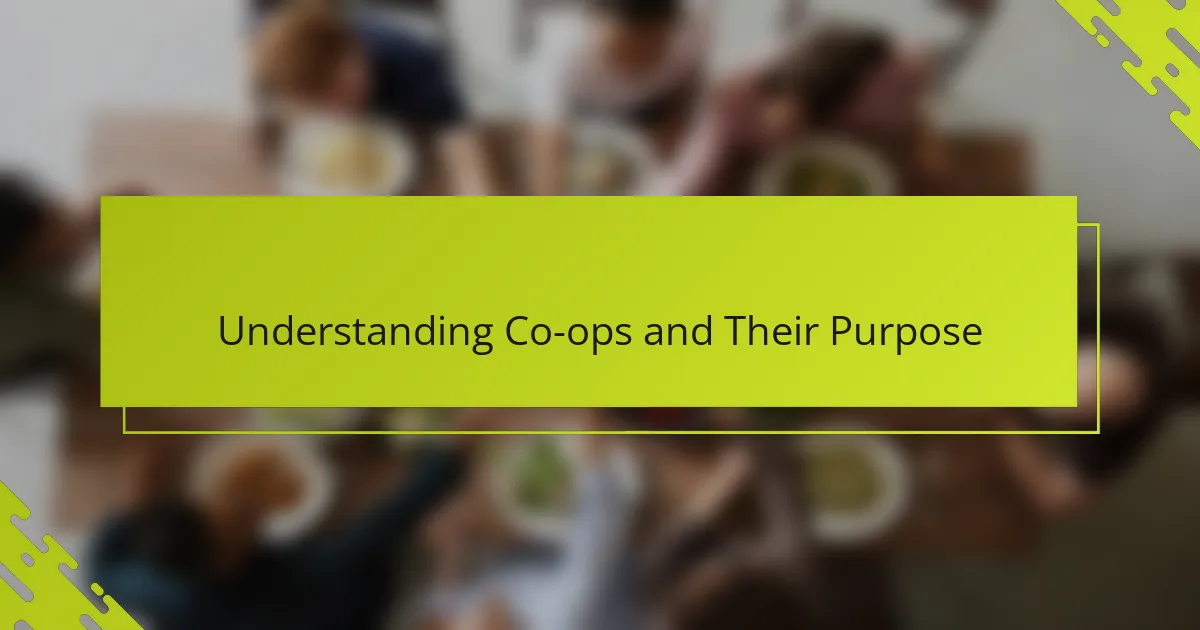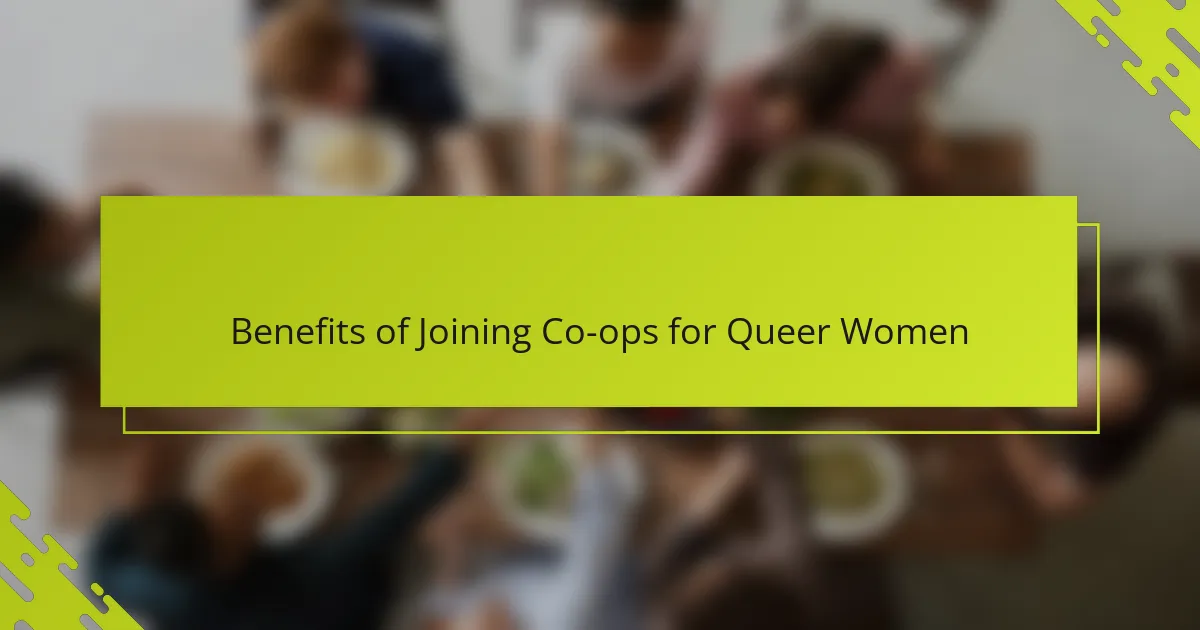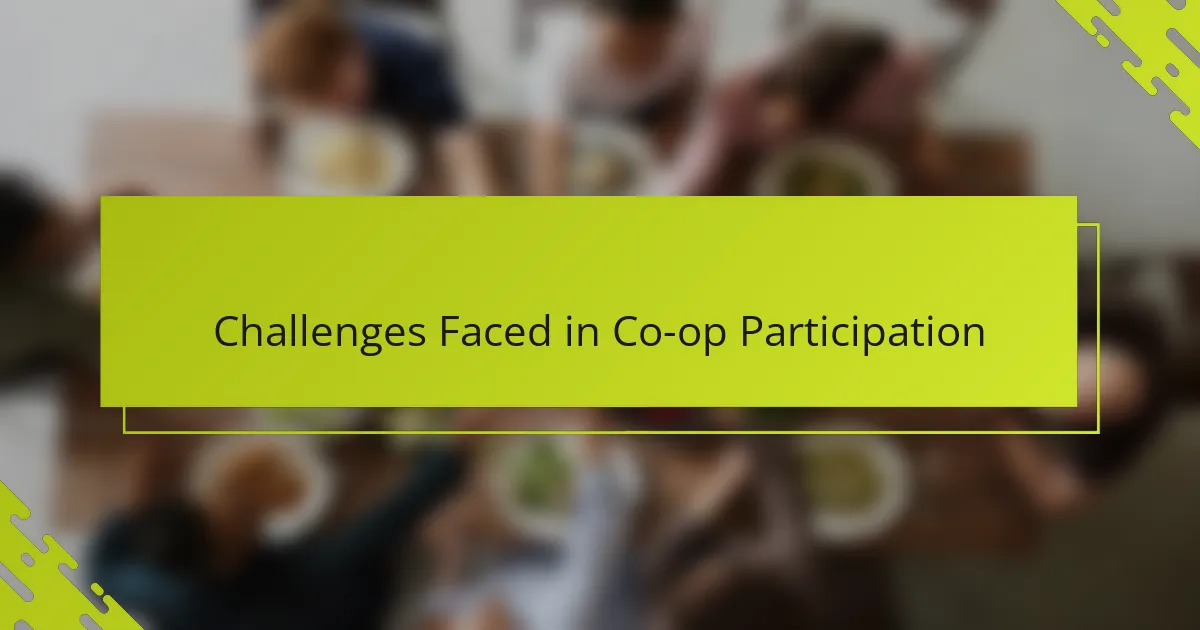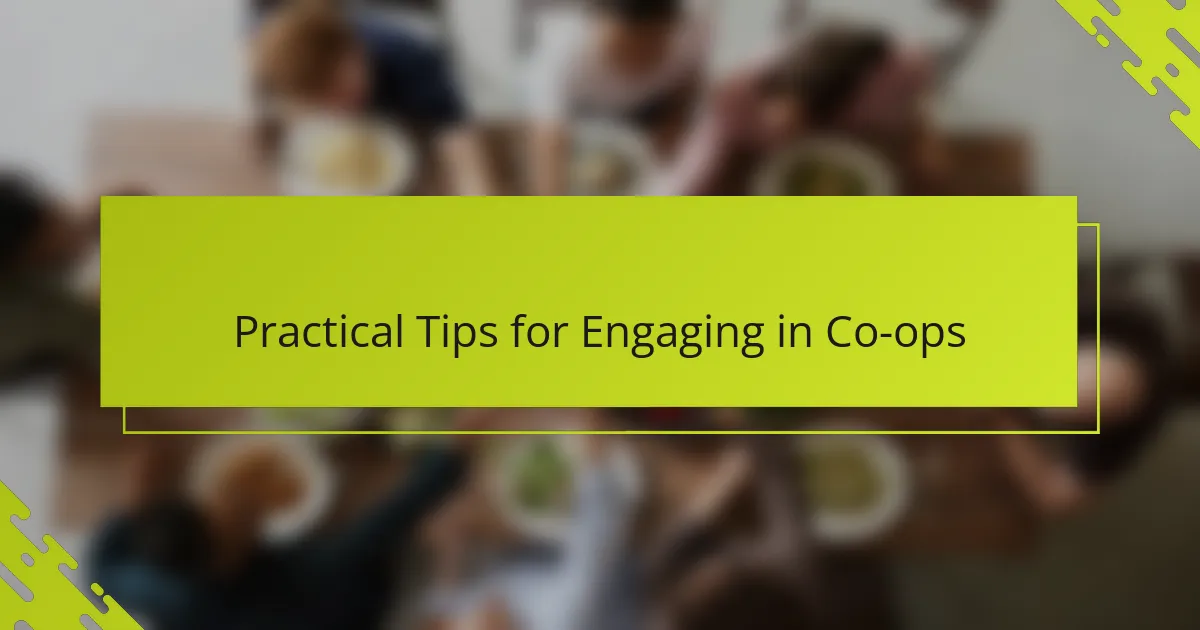Key takeaways
- Cooperatives (co-ops) prioritize member ownership, collaboration, and mutual benefit over profit, fostering a strong sense of community.
- Joining co-ops offers queer women a supportive environment to express themselves, participate in decision-making, and feel valued as whole individuals.
- Challenges in co-op participation include navigating conflicting opinions, managing time commitments, and ensuring all voices are heard.
- Practical tips for engaging in co-ops include being prepared for meetings, prioritizing self-care, and cultivating genuine relationships among members.

Understanding Co-ops and Their Purpose
Co-ops, or cooperatives, are essentially member-owned organizations where everyone has a say. I’ve always found this structure refreshing because it flips the usual top-down approach—have you ever felt unheard in traditional systems? In a co-op, the power balance shifts, making collaboration the heart of decision-making.
From my experience, the purpose of co-ops goes beyond just business; they aim to build community and support each other’s needs. It reminds me of times when I joined smaller groups that felt less transactional and more like a shared journey. There’s an emotional comfort in knowing that everyone involved is invested not just financially but personally.
What really resonates with me about co-ops is their commitment to mutual benefit instead of profit maximization. Isn’t it powerful to be part of something that values equity and trust? This shared ownership creates a sense of responsibility and belonging that I haven’t found in many other setups.

Overview of Queer Women Culture
Queer women culture, in my experience, is a vibrant tapestry woven from diverse identities and experiences. It’s more than just a label; it’s a space where authenticity and connection thrive. Have you ever felt the relief of finding a community that truly sees you? That’s what this culture offers—belonging without needing to fit a mold.
What stands out to me is how this culture embraces fluidity and resists rigid definitions. It celebrates the complexities of gender and sexuality in ways that feel liberating. I remember attending gatherings where conversations flowed effortlessly, blending laughter with deep understanding—moments that felt like home.
There’s also a strong current of activism and resilience running through queer women culture. It’s inspiring how many create safe spaces that challenge societal norms while fostering healing. Don’t we all crave environments where our voices not only matter but also spark change? For me, this culture embodies that hope and power.

Benefits of Joining Co-ops for Queer Women
One of the biggest benefits I’ve found in joining co-ops as a queer woman is the genuine sense of community they cultivate. Have you ever noticed how isolating it can be to navigate spaces that don’t fully understand your identity? In co-ops, I’ve felt seen and supported, not just as a member but as a whole person with unique experiences.
Co-ops also offer a safe space where I can express myself freely without fear of judgment. I remember my first meeting—it was remarkable to engage in conversations where people truly listened and valued diverse perspectives. That kind of openness is rare, and it makes collaboration feel more meaningful and empowering.
Plus, being part of a co-op means sharing in decision-making, which creates a real sense of ownership. It’s not just about showing up; it’s about shaping the group’s future to align with values like inclusivity and equity. Don’t you think that kind of active participation can transform how we build and sustain our communities? For me, it’s been a powerful way to contribute while growing together.

Challenges Faced in Co-op Participation
Sometimes, despite the idealism around co-ops, I’ve found that decision-making can get tangled in conflicting opinions. Have you ever been in a group where everyone’s passionate, but that passion leads to long debates that slow progress? I’ve felt frustration when reaching consensus takes much longer than expected, making it hard to move forward quickly.
Another challenge I noticed was the invisible labor involved—participating actively means committing time and energy that not everyone can spare. I remember juggling work, personal life, and co-op meetings, sometimes feeling stretched too thin. It made me question how sustainable this level of involvement is for those of us balancing multiple responsibilities.
Plus, while co-ops strive for inclusivity, I sometimes sensed that unspoken social dynamics could exclude quieter voices, including mine. Have you encountered moments when being the shy or less assertive member made it harder to be heard? That tension made me realize that even in progressive spaces, intentional efforts are needed to ensure everyone truly feels safe to contribute.

Personal Experiences Joining Co-ops
Joining my first co-op felt like stepping into unfamiliar but welcoming territory. I vividly remember the mix of excitement and nervousness as I navigated meetings where every voice mattered—I wondered if mine would, too. Over time, I realized that showing up consistently and being open helped me build trust and deeper connections with others in the group.
There was a moment when our co-op faced a tough decision on resource allocation, and tensions ran high. I found myself learning not only how to advocate for my perspective but also how to truly listen and find common ground. That experience taught me that joining a co-op isn’t just about shared ownership—it’s about growing communication skills and patience, which felt personally rewarding.
Of course, not all moments were easy. Balancing my commitment to the co-op with work and self-care sometimes felt overwhelming. Have you ever felt that tug between wanting to contribute and needing space for yourself? What helped me was recognizing my limits and communicating openly with other members, which, surprisingly, strengthened our collective respect and understanding.

Practical Tips for Engaging in Co-ops
One tip I’ve learned is to approach co-op meetings with both openness and preparation. Have you ever gone to a group discussion hoping to listen more than speak, only to realize you had important thoughts you hesitated to share? I found that jotting down my ideas beforehand gave me the confidence to speak up and contribute meaningfully.
It’s also crucial to prioritize self-care amidst involvement. Early on, I struggled with overcommitting and ended up feeling burnt out. How do you balance enthusiasm for the cause with your personal boundaries? Setting clear limits on my availability helped me stay engaged without losing my energy.
Finally, building genuine relationships is key. Co-ops thrive on trust, and I’ve noticed that informal chats before or after meetings often open doors to deeper understanding. Taking the time to check in with others—not just about co-op business but about how they’re doing—creates a supportive vibe that keeps me coming back.
